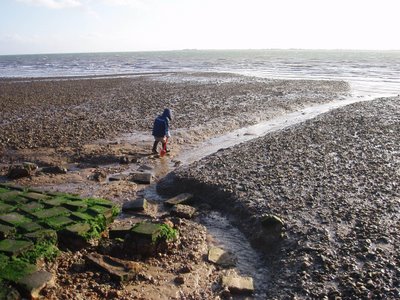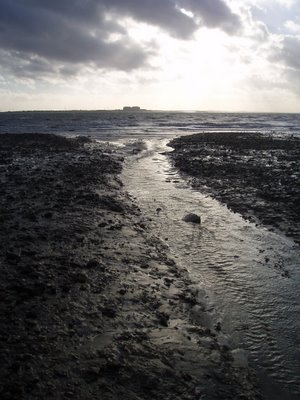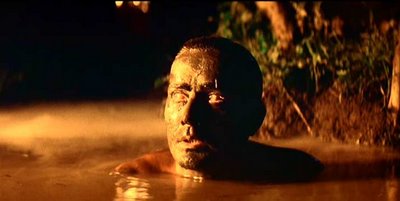Just to say that I have updated my ‘key posts’ list, and made it a bit more coherent. It should now give a guide to my thinking/ writing on various things, not least the Metaphysics of Quality, which I think got lost by the wayside somewhat. So new readers might like to take a look, old hands might see something there that they haven’t seen before.
Monthly Archives: November 2006
Broken Flowers
This was lovely: understated, gentle, a pleasure to watch. I’ll watch pretty much anything with Bill Murray in, and he’s wonderfully human in this, but this was only the second Jarmusch film I’ve seen (after Ghost Dog, which I thought was so good I got my own copy). I’m going to have to explore his back catalogue.
More nuclear shadows
What the Queen should have said
Paul Kingsnorth in inspired mood.
Nuclear shadow
TBTM20061118
About Galileo
This is a partial response to Davidov’s recent comment, relating to the question of Galileo (for a relevant post about miracles go here). Galileo is often brought out as an example of the wickedness of church institutions, and certainly, to execute someone for their beliefs is an abominable act. However, the wickedness of that act – and the use of this example in the various debates between ‘science and religion’ (in truth, internal arguments within the Modernist mindset) has distorted one particular truth – that the debate was not the church suppressing ‘truth’, but the church suppressing an arrogant scientist who was claiming more than he could prove at the time. Thing is, a proper discussion requires us to be in full possession of the facts. Not least because the increasing salience of religious questions in our world in the coming years will force us to examine our deepest assumptions, both religious, atheist, agnostic and absconding – all of us.
I would want to point out two things.
1. Although Galileo’s perspective was correct (ie the earth does travel round the sun) it could not be shown to be correct at the time of the debate, principally because Galileo was assuming perfectly circular orbits, rather than elliptical orbits. The Ptolemaic model was a more accurate model for predicting the movements of the heavenly bodies. Galileo’s perspective had greater beauty, and promised great things, but it could not be shown to be correct at the time of his trial. (See Kuhn on this, amongst others).
2. The church authorities did not rule out the possibility of change. I quote from Cardinal Bellarmino (Galileo’s antagonist): “If there were any real proof that the Sun is in the centre of the universe and that the earth is in the third heaven, and that the Sun does not go round the Earth but the Earth around the Sun, then we would have to proceed with great circumspection in explaining passages of Scripture which appear to teach the contrary, and rather admit that we did not understand them than declare an opinion to be false which is proved to be true”.
In other words, if Galileo could have proved his point, then the Church would have backed down. I think this is very important to bear in mind. It doesn’t exonerate the church for what they did, but it does clarify what it was they were objecting to. And that makes all the difference.
(Source: Feyerabend)
TBTM20061117
The Oil Drum on "Peak Oil Myth" (CERA report)
If you’re interested, go read for a) a great overview of what Peak Oil claims, and b) a thorough deconstruction of the CERA report currently doing the rounds in the business media.
Non-violence from a different angle
In a comment, the question was asked why violence was always sinful. Pondering that further leads to questions of coercion, of violating I-Thou in favour of I-It relations, of defacing the image of God. And so on. (I do wonder whether violence – as in physical aggression – has not become totalised/idolised as a radical evil. Words can do much greater violence to a soul. In many ways, an act of righteous anger – the No! of Camus’ rebel – this seems less immoral than the slow poisoning of human relationships that never leads to direct violence. Jesus, after all, says rather more about language in human relationships than he does about violence.)
A while back, I wrote about capitalism, particularly with respect to Hernando de Soto’s work (see here). One of the key insights of de Soto’s research is the huge obstacles placed in the way of entrepreneurial activity in poor countries; hundreds of forms to be filled in; ages of time before work was rendered legal and visible to the authorities.
It is not an exaggeration to say that the existence of this type of bad-governance is directly responsible for the impoverishment of millions around the world, and that it is also therefore directly responsible for the deaths of millions around the world.
Let us imagine a) that a democratic system achieves a change of government which works to change these things (and therefore save people’s lives), but that b) those with a vested interest in the status quo ante (and there are always such people) resist the new government, not violently, but politically. Their property might be taken away; or, more likely, their economic opportunities and relative economic strengths are diminished. Hence they oppose, they struggle against this new dispensation.
In what way does the treatment of those opposed to this benign economic reform NOT qualify as ‘violent’ – in the deeper sense of coercion, I-Thou to I-It relationships, as opposed to a simple ‘well we haven’t beaten them up, have we?’ These individuals are not being treated as ends in themselves. Their interests and desires are placed in a minor relationship to the interests of the community as a whole.
Imagine that in the interests of non-violent interactions, these people were allowed to keep their perks and privileges – and therefore millions elsewhere remain mired in poverty. This respects the humanity of some, to the exclusion of others.
I think there is something here about masculinity. That the male capacity for making extreme choices – what is consistently explored to great effect in 24 for example – this has been culturally repudiated.
Thing is, Jesus makes extreme choices. You might say: Jesus ain’t no cissy.
I’m trying to put my finger on something darkly and deeply rooted here – a violent passion for life is the best way I can describe it.
That not only is a penis a gift from God, but the phallus too.
This haunting passage from Apocalypse Now:
I’ve seen horrors… horrors that you’ve seen. But you have no right to call me a murderer. You have a right to kill me. You have a right to do that… but you have no right to judge me. It is impossible for words to describe what is necessary to those who do not know what horror means. Horror. Horror has a face… and you must make a friend of horror. Horror and moral terror are your friends. If they are not then they are enemies to be feared. They are truly enemies. I remember when I was with Special Forces. Seems a thousand centuries ago. We went into a camp to inoculate the children. We left the camp after we had inoculated the children for Polio, and this old man came running after us and he was crying. He couldn’t see. We went back there and they had come and… hacked off every inoculated arm. There they were in a pile. A pile of little arms. And I remember… I… I… I cried. I wept like some grandmother. I wanted to tear my teeth out. I didn’t know what I wanted to do. And I want to remember it. I never want to forget it. I never want to forget.
And then I realized… like I was shot… like I was shot with a diamond… a diamond bullet right through my forehead. And I thought: My God… the genius of that. The genius. The will to do that. Perfect, genuine, complete, crystalline, pure. And then I realized they were stronger than we. Because they could stand that… these were not monsters. These were men… trained cadres. These men who fought with their hearts, who had families, who had children, who were filled with love… but they had the strength… the strength… to do that. If I had ten divisions of those men our troubles here would be over very quickly. You have to have men who are moral… and at the same time who are able to utilize their primordial instincts to kill without feeling… without passion… without judgment… without judgment. Because it is judgment that defeats us.
There is something truly frightening about the tragic vision – about the capacity to choose sin boldly (as described in my Iraq post here).
Whilst I feel viscerally the appeal of non-violence, whilst there is still no question in my mind that the way of peace is the way that we are called to live together, I still can’t bring myself to let go of something here. That there is something in the tragic vision, the embrace of the painful choice, which is profoundly life-affirming and of God. There can be no generation without the blood shed from the hymen being broken.
The question of imagination is closely tied in with this – if we imagine only good things, will the bad things go away? I don’t know.
I’m still inching forward through the murk.









